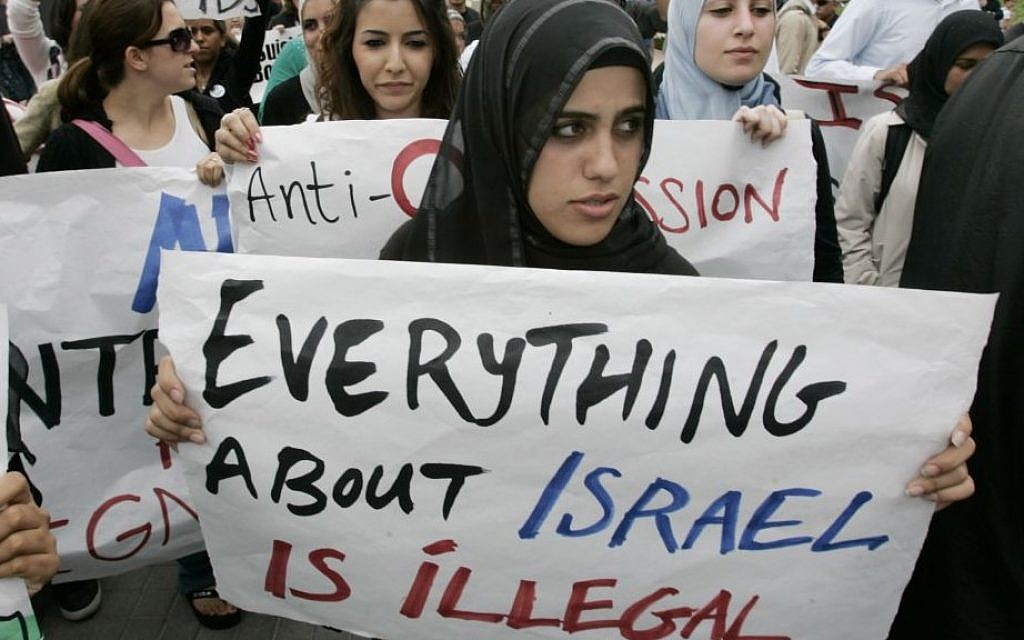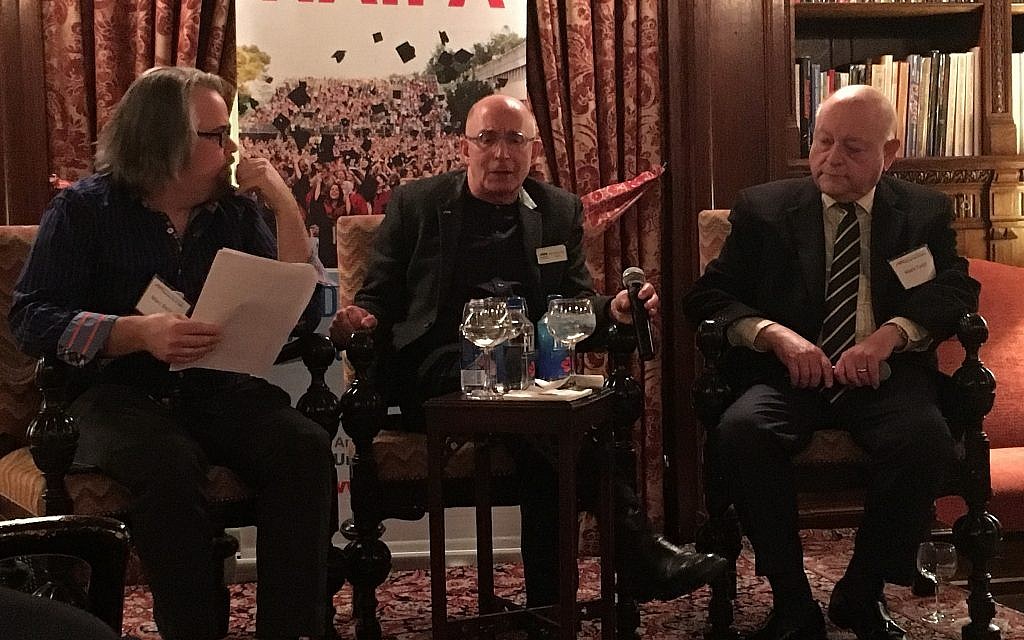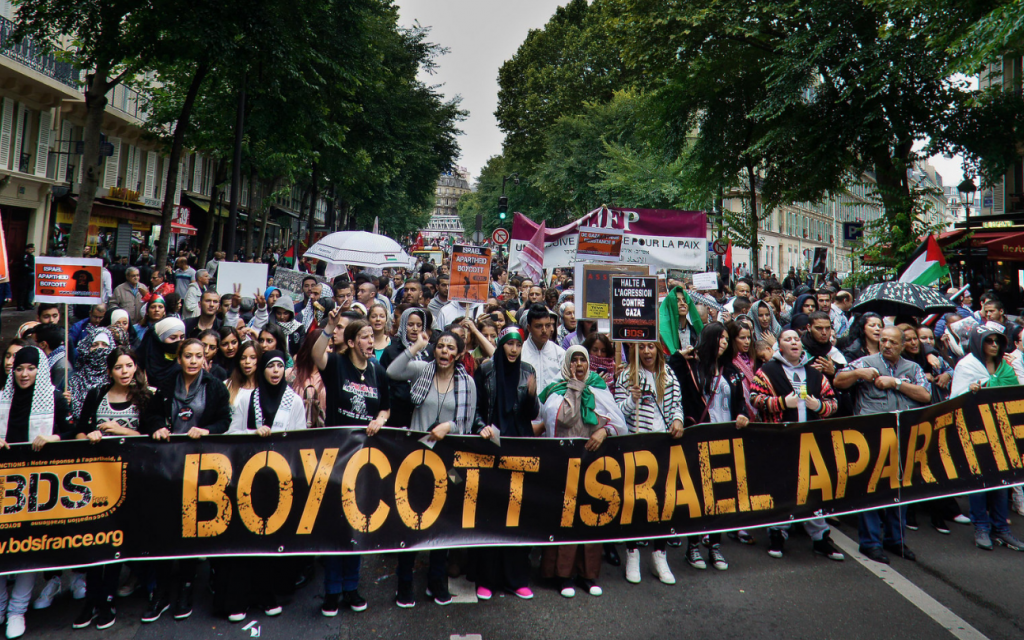 Where is the right to free speech for Israel advocates on campus, academics ask
Where is the right to free speech for Israel advocates on campus, academics ask
CATHRYN J. PRINCE
Former University of California and current University of Haifa presidents note that while BDS activists regularly use anti-Semitic tropes, Jewish voices aren’t given a fair shake
 Illustrative: Muslim students at an anti-Israel protest at the University of California, Irvine, in 2006. (Mark Boster/Los Angeles Times via Getty Images/JTA)
Illustrative: Muslim students at an anti-Israel protest at the University of California, Irvine, in 2006. (Mark Boster/Los Angeles Times via Getty Images/JTA)
NEW YORK — Eight years ago a group of Muslim students shouted down Michael Oren, former Israeli ambassador to the United States, as he delivered a speech on US-Israel relations at University of California. Flash forward to last Friday night at the University of Virginia. Pro-Palestinian students disrupted a number of Israel Defense Force reservists participating on a panel “Building Bridges.”
Whether it’s eight years or eight days ago, when pro-Israel speakers come to campus it’s almost a sure bet those aligned with the Boycott, Divestment and Sanctions Movement (BDS) will show up to boo, hiss and intimidate, said Mark Yudof, former president of the University of California. He was speaking last Monday night during a conversation hosted by The American Society of the University of Haifa.
“The name of the game is shouting down Israeli, Jewish and pro-Israeli speakers. [After the event] I was told, ‘Mr. President, free speech is for marginalized people, not for privileged people.’ And that is the problem,” Yudof said during the panel discussion with Ron Robin, president of the University of Haifa.
Started in 2005, the BDS movement has grown into a global campaign determined to promote various forms of boycott against Israel. While trying to emulate the 1980s campaigns against South African apartheid, the movement uses anti-Semitic rhetoric, and frequently targets Jewish students, Israeli guest speakers, or pro-Israel speakers on college campuses in North America and Europe.
Yudof and Robin sat inside the richly paneled library of Manhattan’s Lotos Club, one of the oldest literary clubs in the nation — an appropriate setting for a discussion about BDS and free speech.
 Mark Yudof, former President of the University of California (right), Ron Robin, President of University of Haifa (center), and Marc Berley (left) at a special briefing hosted by the American Society of the University of Haifa in New York, February 2018. (Cathryn Prince/Times of Israel)
Mark Yudof, former President of the University of California (right), Ron Robin, President of University of Haifa (center), and Marc Berley (left) at a special briefing hosted by the American Society of the University of Haifa in New York, February 2018. (Cathryn Prince/Times of Israel)
Healthy campuses ought to be places of debate, even heated debate, Yudof said. Yet, at a time when phrases such as “safe spaces,” “trigger warnings” and “intersectionality” have entered the lexicon, there are some university students who believe the freedom to speak only applies to a few, he said. “It’s demoralizing, particularly for Jewish students. They hear how Jews control the media, Jews control Congress. So it’s anti-Semitic. It would be how Nazis in the 1930s talked, or the mayor of Vienna at the time,” Yudof said.
“There is a clear double standard. They [BDS] don’t worry about how gay people are treated, how Turkey treats its minorities, how the Chinese act in Tibet,” he said. He added that there is a consensus among some university presidents and chancellors that “Jewish students are too white, too privileged and not needy,” and therefore don’t need protection.
 Illustrative: BDS movement in France. (CC BY-SA, Odemirense, Wikimedia commons)
Illustrative: BDS movement in France. (CC BY-SA, Odemirense, Wikimedia commons)
read more: Where is the right to free speech for Israel ..
Zawartość publikowanych artykułów i materiałów nie reprezentuje poglądów ani opinii Reunion’68,
ani też webmastera Blogu Reunion’68, chyba ze jest to wyraźnie zaznaczone.
Twoje uwagi, linki, własne artykuły lub wiadomości prześlij na adres:
webmaster@reunion68.com
